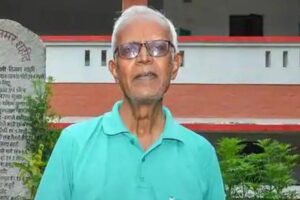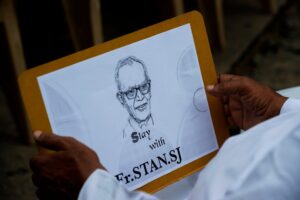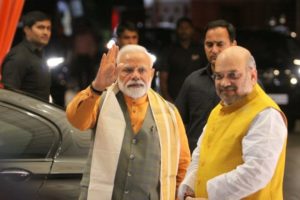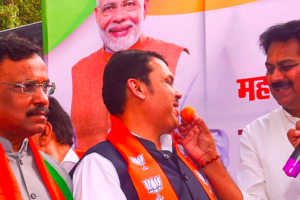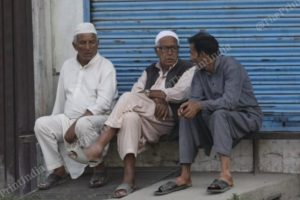July 7, 2021
“While we grieve at the passing away of Father Stan Swamy, we unequivocally hold the negligent jails, the indifferent courts and the malicious investigating agencies firmly responsible for his unfortunate death.”
New Delhi: The family members and friends of the rights activists arrested in the Bhima Koregaon-Elgar Parishad case have issued a statement after Father Stan Swamy’s death, terming it an “institutional murder”.
Swamy, an 84-year-old tribal rights activist and Jesuit priest, passed away on Monday after months of ill health and contracting COVID-19 in jail. He was denied bail despite his condition, and had to go to court each time he needed even basic care while custody.
“This is not a natural death, but the institutional murder of a gentle soul, committed…
July 7, 2021
NEW DELHI — A Jesuit priest and activist with Parkinson’s disease, whose high-profile arrest was seen as an example of the broad scope of the Indian government’s unpopular antiterrorism law, died on Monday still in custody at a hospital in Mumbai, his lawyer said.
The Rev. Stan Swamy — at 84 the oldest person to be accused of terrorism in India — was arrested last October under the Unlawful Activities Prevention Act, which critics say is meant to stifle dissent. His detention incited widespread accusations of government cruelty.
Rights activists and other critics say the government of Prime Minister Narendra Modi has used the act and the coronavirus pandemic as a pretext to round up…
December 27, 2019
As the campaigner-in-chief for the Citizenship (Amendment) Act and the National Register of Citizens, Home Minister Amit Shah has been making, with his characteristic belligerence, a number of arguments both inside and outside Parliament in defence of his government’s initiative. These arguments have been echoed by a host of BJP ministers, MPs and supporters on social media. Those of us who oppose this divisive exercise in India need to face these claims squarely
Read more:
December 9, 2019
Three million Uighur Muslims are estimated to be detained in Chinese concentration camps. Thousands of Yazidis, Christians, and others live on the edge of extinction in their ancient homelands in Iraq and Syria after the Islamic State’s genocidal rampage against them. Prisoners of conscience around the world are incarcerated for their beliefs, actions, or peaceful advocacy in support of their faith. The United States must continue and expand its work in support of religious freedom worldwide.
This is why it is so important that Congress reauthorize the United States Commission on International Religious Freedom. USCIRF is an independent, bipartisan U.S. federal government commission dedicated to defending the universal right to freedom of religion or belief abroad. Composed of…
December 9, 2019
A recent hearing on human rights in South Asia focused almost exclusively on the issue of Kashmir, a disputed region which is claimed, at least in part, by India, Pakistan, and China. Legislators and witnesses at the hearing spent a great deal of time denouncing the Indian government’s response to the Pulwama attack of February 2019, in which terrorists killed 40 Indian police officers.
Pakistan’s role in all this, however, went largely unmentioned. Just a few days before the hearing, Pakistani Sen. Sirajul Haq declared, “There is no resolution of the Kashmir problem except through jihad” and that ” nation is ready to fight against India.”
Haq is the emir of Jamaat-e-Islami Pakistan, a multinational radical…
November 25, 2019
It’s as official as it can get, because Home Minister Amit Shah has said so in Parliament. The National Register of Citizens – a citizenship crucible – will be repeated in Assam, and be conducted across India now. The exercise will unleash, once again, a new set of anxieties among all Indians, just like it did in Assam. Another trial by fire, even for those singed already.
But the political question to ask is this: How do Amit Shah and Narendra Modi keep Indians perpetually anxious and ensure that the voters still keep voting for them in elections? Keep citizens busy, and make sure the report card reflects on them and not the BJP government.
Read more:
November 25, 2019
It will be easy, as also natural, to feel outraged at the constitutional travesty enacted at the governor’s house in Maharashtra this morning.
The birth of a new government should be a cheerful occasion but this was a joyless affair. Indeed, the Devendra Fadnavis-Ajit Pawar skulduggery can only be compared with the fraud of July 1984 when G.M. Shah was sworn in at midnight as chief minister of Jammu and Kashmir by governor Jagmohan.
But those were bad old days of an autocratic, authoritarian Indira Gandhi. And that should be a matter of some satisfaction to all that the New India has finally begun to look very much like the soiled Old India.
Read more:
https://thewire.in/politics/coup-in-maharashtra-devendra-fadnavis
November 24, 2019
Not Narendra Modi, Amit Shah is the new face of Indian state for hurt and angry Kashmiris.
ou know what’s afsos mithai?” I did not. But soon it transpired that I did. As a child I called it boodhi amma ke baal. Much later, I would learn the English name for it: candy floss. “For us Kashmiris, Article 370 was like afsos mithai. Lovely appearance, but you regret (afsos) as soon as you find out how little it contains.” I was speaking to Karim (all names changed), this young man in mid-30s with piercing eyes that bore a hole in my skin.
I was in Kashmir for three days, mainly to listen to apple-growers and to assess the damage to their crops. But Kashmiris…
November 22, 2019
After the appointment of Firoz Khan as a professor of Sanskrit at Benaras Hindu University, a group of around twenty students, allegedly having past links to the ABVP and RSS, protested against the same by claiming that a Muslim professor couldn’t teach them Sanskrit because he wasn’t connected to their culture or religion.
Khan, who has a doctorate in Sanskrit as well as qualified the NET-JRF, went onto say that all his life, he has learned Sanskrit with zeal and nobody had ever made him feel out of place because of his religion. He added that while he was hurt by the protest, he will try to undo the feelings in the students by his teaching, if given…


